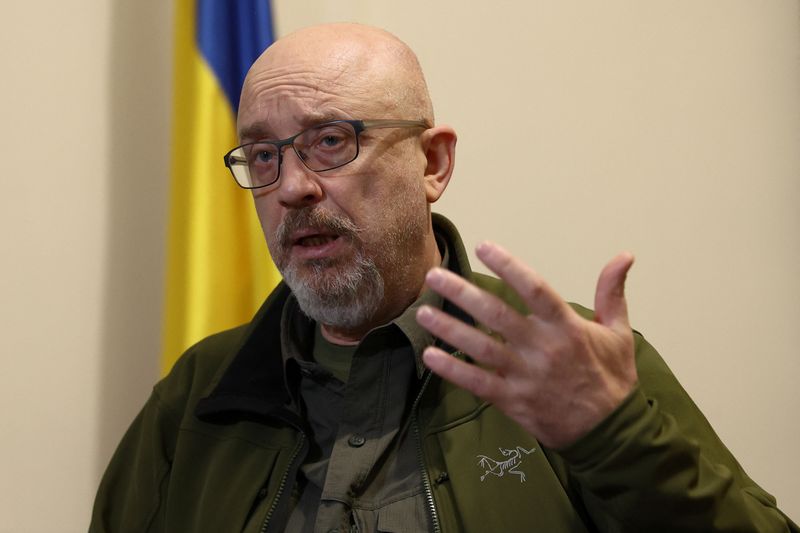By Max Hunder and Tom Balmforth
KYIV (Reuters) -Ukraine's defence minister said on Thursday it would take Russia at least a week to withdraw its troops from the southern city of Kherson and that winter would slow down battlefield operations, giving both sides a chance to regroup.
In an interview in Kyiv, Oleksii Reznikov said Russia had 40,000 troops in Kherson region and that it still had forces in the city, around the city and on the west bank of the vast Dnipro River despite announcing their retreat.
"It's not that easy to withdraw these troops from Kherson in one day or two days. As a minimum, (it will take) one week," he told Reuters, saying it was difficult to predict Russia's actions and that Kyiv was focused on its own plan.
Russia announced on Wednesday it would withdraw from the west bank of the Dnipro that includes Kherson city, the only regional capital Moscow has captured since invading Ukraine in February.
Reznikov said that such an exit would free forces from both sides to fight elsewhere and suggested Russia could beef up its units in the neighbouring region of Zaporizhzia that has also been partially occupied for months.
"The winter will slow down every activity on the battlefield for all sides ... It's beneficial for all sides. You will have a rest," he said.
He predicted Ukraine would come out of the hiatus strong, reinforced by thousands of soldiers being trained in Britain.
"We will use this time with a maximum result for our armed forces, for regrouping, for refreshing and for rotation and we will prepare them well."
'CRAZY' IDEA
Speaking in Kyiv's heavily guarded government district, Reznikov played down the threat of a Russian nuclear strike in Ukraine and dismissed as "crazy" the idea Moscow might blow up the vast southern Kakhovka dam as it withdraws.
He said that such a move would flood areas controlled by Moscow and also cut off their access to fresh water supply via a canal from the Dnipro to annexed Crimea.
"If you check the landscape in this district, you will find that the western bank is higher terrain and the east bank is lower terrain," he said.
"This means the water will flow east of this bank and they will have a risk for their troops," he said.
Both sides in the conflict have accused the other of planning to destroy the dam.
On the nuclear threat, he said it would be neither pragmatic nor practical for Russia to resort to a step that would risk souring relations - and trade - with countries like India and China.
HOPES OF RUSSIAN INFIGHTING
Reznikov was appointed defence minister in November 2021, just a few months before Russia's invasion.
Bespectacled and jovial, the ex-lawyer had a professorial air despite his military-style clothing.
Ukraine, he said, had built up a security and defence force of 1 million personnel to guard what he described as Ukraine's "non-friendly" 2,500-km border with Belarus, Russia and occupied Ukrainian areas.
He said that if - or when - Kyiv's forces reach the Dnipro River in Kherson region, they would still not be able to hit the Russian-annexed Ukrainian peninsula of Crimea with their U.S.-made High Mobility Artillery Rocket Systems (HIMARS) and other weaponry.
He said he believed Russia's annexation of Crimea, which Kyiv vows to reverse, would eventually be resolved without fighting, possibly as a result of Russian infighting.
Reznikov accused the new commander of Russia's invasion forces of carrying out a "doctrine of terrorists" by heavily bombarding civilians and critical infrastructure.
He also said that the Russian army under General Sergei Surovikin appeared to have become more disciplined since his appointment in October.
Asked if Moscow's tactics had changed under Surovikin, Reznikov said:

"Yes, he changed it because he's using terrorism tactics against civilians and infrastructure objects using cruise missiles, rocket missiles and drones, special Iranian drones."
"They don't send to Ukraine one or two rockets as before; they use 40 in a day and then wait - and then again, and again," he said.